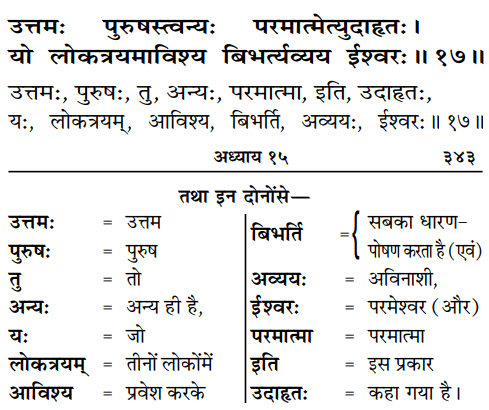Bhagavad Gita Chapter 15 Verse 17
Gita 15.17
उत्तमः, पुरुषः, तु, अन्यः, परमात्मा, इति, उदाहृतः,
यः, लोकत्रयम् आविश्य, बिभर्ति, अव्ययः, ईश्वरः।।17।।
Gita 15.17
UttamH, purushH, tu, anyaH, Parmatma, iti, udaahrtH,
YaH, loktryam’, aavishya, bibharti, avyyaH, iishwarH ||17||
Translation: (UttamH) Supreme (PurushH) God (tu) however, than the foresaid Gods, Kshar Purush and Akshar Purush (anyaH) is someone else (yaH) who (loktryam’) in the three loks (aavishya) entering (bibharti) maintains/sustains everyone and (avyyaH) eternal (iishwarH) Parmeshwar (Parmatma) Parmatma (iti) as (udaahrtH) is called. (17)
Translation: The Supreme God is, however, someone else other than the two aforesaid Gods, Kshar Purush and Akshar Purush, who by entering the three loks, sustains everyone and is called as the Eternal Parmeshwar Parmatma (Immortal Supreme God).
Bhagavad Gita Chapter 15 Verse 17
by Gita Press Gorakhpur

Purport - Bhagavad Gita Chapter 15 Verse 17
Gita 15.17 clarifies that Supreme God is actually someone else. It proves that the God who can be called Supreme is different than the knowledge giver of Bhagavad Gita. Chapter 15 Verse 17 also clarifies that this Supreme God is immortal and sustains everyone by entering the three lokas. This in true sense is the Supreme God. This proves that the God who is giving the knowledge of Bhagavad Gita is not the Supreme God. He has described regarding himself from verses 15.12 to 15.15 but in 15.17 he talks about the Supreme God.
Bhagavad Gita Chapter 15 Verse 16 Bhagavad Gita Chapter 15 Verse 18
Categories: chapter-15 | Tags:
